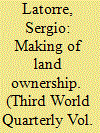| Srl | Item |
| 1 |
ID:
093781


|
|
|
|
|
| Publication |
2010.
|
| Summary/Abstract |
Gender mainstreaming is portrayed as the next step in the global gender equality landscape and has been widely adopted internationally in a variety of governments and political organisations. However, the radical potential of gender mainstreaming to transform organisations has not been fulfilled. In this article, I explore three paradoxes which are inherent in the intent, implementation and institutionalisation of gender mainstreaming. I argue that we cannot fully understand these global paradoxes without a better understanding of local experiences which underpin them in the everyday working lives of those people involved in advocating gender mainstreaming. Using results from an institutional ethnography of the implementation of the Gender Equality Duty by gender mainstreaming advocates in the Scottish Executive, I show that bureaucratic practices, fossilised norms and the continued reliance on soft measures to promote mainstreaming are reflections at the local level of barriers to the advancement of global gender mainstreaming. By taking seriously the local practices and knowledge of those who do gender mainstreaming, we can reflect on the inherent tensions within gender mainstreaming that prohibit its ability to truly transform the gender landscape at both the local and global level.
|
|
|
|
|
|
|
|
|
|
|
|
|
|
|
|
| 2 |
ID:
140969


|
|
|
|
|
| Summary/Abstract |
Hernando de Soto’s best-selling book The Mystery of Capital argues that economically disadvantaged countries lack institutional arrangements that can spur economic development and capital growth. This article questions de Soto’s institutional economist account. It draws on a 14-month ethnographic study performed at two rural field sites in Colombia and in the central government office responsible for promoting land programmes designed to improve the living conditions of rural communities. This study, which focuses on the daily practices of public officials and rural campesinos, suggests the importance of the title document, and in particular the public deed, for land ownership. It describes the process by which landownership is created by the issuance of the land title document and highlights some important elements and untended consequences that are often neglected in this process of making land a legal and economic asset.
|
|
|
|
|
|
|
|
|
|
|
|
|
|
|
|
| 3 |
ID:
159257


|
|
|
|
|
| Summary/Abstract |
This article examines the complexities of women’s increasing participation in international development programming for gender equality. Taking a specific setting in rural Kyrgyzstan where one such project has been operating, the researchers discover adverse effects on the local women’s livelihoods, status and health. Women’s contradictions are attributed to the women’s own failures and lacks, creating confusion and frustration among them. Adopting Smith’s institutional-ethnography approach, we explicate and map out the hidden processes which must be held accountable for these reactionary outcomes, taking women’s experiences as entry points to inquiry. We find that the reactionary effects are not accidental but organized, powerfully, systematically but invisibly, by taken-for-granted institutional practices serving the purposes of global development institutions, where women are seen as instruments of global economic growth. The analysis provokes critical discussion of ‘how’ and ‘what’ it takes to transform Central Asian women into ‘empowered’ people.
|
|
|
|
|
|
|
|
|
|
|
|
|
|
|
|